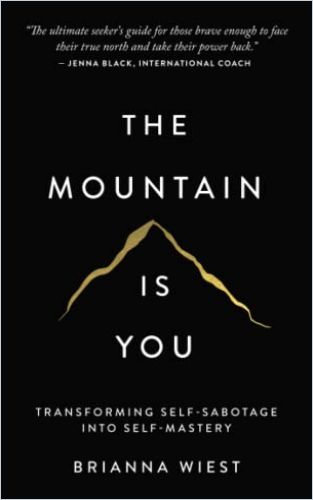Self-help poet and best-selling author Brianna Wiest offers a blueprint for escaping your overactive mind.

You Are Not Your Thoughts
Stop blaming others for your inability to enjoy your life, says poet and best-selling author Brianna Wiest. She explains that the challenges you face are growth opportunities, as she urges you to learn to recognize the symptoms of self-sabotage and replace them with positive strategies. Drawing on sources including neurological research and Buddhist teachings, Wiest offers a comprehensive – if at times unoriginal – guide to help you master your emotions, overcome trauma and make powerful mind-set shifts to unlock your potential.
Nice work if you can get it, of course. Wiest functions in the Brené Brown realm of teaching self-compassion, and most people can use education in that area. Her poet’s approach to language and life raises aspects of this above the self-help run-of-the-mill, but the randomness of her presentation may daunt all but the most determined reader.
Self-Sabotage
Wiest proves astute when she writes that engaging in self-sabotage is a natural response to an unconscious, unmet need. You embrace self-sabotage to avoid the pain and discomfort growth demands. Self-sabotaging behaviors occur when your conscious desire conflicts with an unconscious desire. For example, perhaps you repeat unhealthy relationship patterns because you unconsciously associate love with abandonment and seek relationships you know are doomed.
Human beings are guided by comfort. They stay close to what feels familiar and reject what doesn’t, even if it’s objectively better for them. Brianna Wiest
You are self-sabotaging when you resist leaving survival mode; joy makes you uncomfortable; you constantly change jobs, homes or romantic partners; you fall prey to perfectionism; you cannot process your emotions; you make excuses; you live in disorganization; you judge others; and you seek toxic relationships.
If you self-sabotage, Wiest asserts, you probably crave external approval above all and wait for others to give you opportunities; share your attention with everyone instead of treating it as a precious, limited resource; believe your self-doubts over all the evidence; prioritize being likable; hide from difficult truths; and focus more on fears than on imagining your ideal future.
Triggers and Intuition
Wiest wants you to differentiate between your intuition and your fear-based thoughts. Intuitive thoughts feel loving, calm, rooted in the present moment and quiet. They typically generate feelings of understanding and lead you toward situations and people that help you become your best possible self.
It is essential that you learn to take action before you feel like doing it. Taking action builds momentum and creates motivation.Brianna Wiest
When your fear creates thoughts, by contrast, they feel invasive and irrational, and you start to panic. You become more reactive than responsive and often spiral toward forming irrational conclusions, which you then act on to your detriment. Let your intuition guide you toward feeling good and becoming more proficient at meeting your needs.
Unhappiness
Wiest explains why you don’t experience happiness when you get what you thought you wanted. Your brain releases the hormone dopamine when you achieve your goals, but rather than giving you sustainable pleasure, dopamine keeps you in a state of perpetual craving, thus preventing you from enjoying your success.
We have to use our supreme intelligence to decide where we want to go, who we want to be, and then we have to allow our bodies to adjust over time. Brianna Wiest
When things go well, you may experience “adjustment shock.” Align your mind-set with your new circumstance. True change doesn’t occur in sweeping breakthrough moments, but in “micro-shifts” over time.
Painful Memories and Trauma
Address your wounds and create room for positive growth by imagining going back in time to one of your most difficult memories, then tell your younger self that everything will work out better than you expect.
What you build in the wake and the aftermath of loss will be so profound, so stunning, you will realize that maybe the loss was part of the plan.Brianna Wiest
Traumatic experiences can manifest as bodily tension. Engage in embodied practices, such as body scan meditations, to release your stored trauma. Cultivate an awareness of your embodied pain to help you recover. Help yourself feel safer after a traumatic experience by slowly re-exposing yourself to the things that scare you, and enlist the support of a therapist if needed.
For example, rather than avoiding relationships after a traumatic breakup, work toward slowly cultivating healthy relationships with new people. Remember that your value isn’t contingent upon attaining everything you want.
Gifts
Your ideal future self should align with your life purpose. Reflect on your values, what you care most about, how you hope to feel and anything that creates anxiety in your life. What matters most is how you face adversity, how you spend each day and how you treat people – not the inner struggles you face momentarily.
Cultivate more inner peace, Wiest urges, by remembering that the fear and ego-based emotions driving anxiety aren’t facts. An overthinking brain arrives at conclusions that don’t reflect reality. Underscoring her theme, Wiest reminds you to regard your mountains or challenges as your greatest gifts and growth opportunities.
A Poet’s Soul
Lacking, for example, Brené Brown’s academic credentials, Wiest brings her poet’s soul to bear on the perpetual problem of getting out of your own way and treating yourself with the respect you deserve. Though Wiest is capable of remarkable insight and phrases you will long remember, at times, she devolves into platitudes, clichés and notions you’ve no doubt encountered before. She alternates between these two with the same emphasis and conviction, which undermines her credibility.
The book’s structure and certain chapter structures seem haphazard, which makes it difficult to track Wiest’s ideas, but the best ones emerge most clearly in short bites, anyway. They resonate strongly while others make no impression at all. Greater authorial rigor would have made this a more rewarding read, but you will never doubt Wiest’s sincerity.
Brianna Wiest’s books include the bestsellers 101 Essays That Will Change the Way You Think; When You’re Ready, This Is How You Heal; Ceremony; and I Am the Hero of My Own Life.





